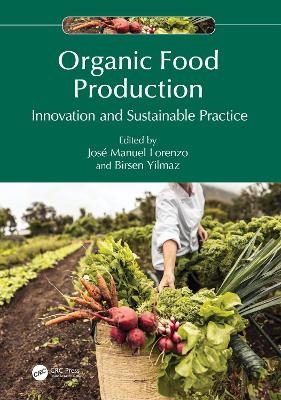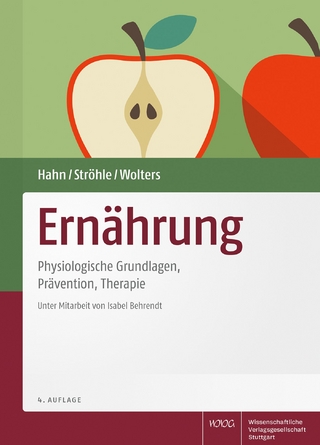
Organic Food Production
CRC Press (Verlag)
978-1-032-43817-7 (ISBN)
- Noch nicht erschienen (ca. Dezember 2024)
- Versandkostenfrei
- Auch auf Rechnung
- Artikel merken
The organic products market is experiencing rapid growth. This surge can be attributed to consumer perception of organic products as healthier options with better nutritional profiles compared to conventional products. Furthermore, organic production is gaining global significance beyond just human health considerations. It is increasingly viewed as a potential alternative to conventional agriculture due to mounting concerns over environmental sustainability, food safety, animal welfare, and biodiversity conservation. In developed countries, the demand for organic products is increasing steadily, and a significant part of the food consumed comes from organic sources. The increase in the production and consumption of organic foods has made it one of the most important research topics in recent years.
Organic Food Production: Innovation and Sustainable Practice provides comprehensive insights into various aspects of organic foods, including their production processes, certification procedures, regulatory frameworks, global market dynamics, and consumer preferences and acceptance. Additionally, the book offers valuable analyses of how organic foods impact the environment and contribute to achieving sustainable development goals.
Key Features
Includes a comprehensive view of various aspects of organic foods
Provides insights into how organic foods contribute to sustainable goals
Helps readers understand the differences between organic and conventional foods
Provides a deep understanding of consumer behavior toward organic foods
José Manuel Lorenzo is Head of Research at the Meat Technology Centre of Galicia (CTC), Ourense, Spain and Associate Professor at the University of Vigo. He has a degree in Food Science and Technology from the University of Vigo (1995-2000). In 2005-2006 from October to March, he completed his training with a predoctoral stay at the Stazione Sperimentale per L´Industria delle Conserve Alimentaria (Parma, Italy). He obtained his Ph.D. in Food Science and Technology (University of Vigo) in 2006. He has started his scientific career in the Department of Food Science and Technology at the University of Vigo, first as a researcher scholarship, then, since April 2006, as an academic researcher. In 2007 joined the CTC staff, developing since then an intense collaboration with the industrial sector, private companies, and research institutions as PI of several projects of R&D and innovation in the Food Science area, with an emphasis on Healthier and Functional Foods development. His desire to be continuously trained has led him to make two international stays for two months each at the University de São Paulo (Brazil) and the University of Bari (Italia) in 2016 and 2018, respectively. These stays allowed him to strengthen international relations for future collaborations in calls for European and International projects, as well as the cooperation in training programs for research and technical personnel. Nowadays, he leads a multidisciplinary team of researchers and technicians at CTC. His main research lines are (i) Reduction of additives in meat products; (ii) Development of new healthier meat products; (iii) Use of agri-food industries by-products as potential sources to obtain valuable and bioactive compounds; (iv) Use of emerging and green technologies (supercritical fluid extraction and pulsed electric fields) for the recovery of biologically active compounds from several plant matrices and by-products; (v) Incorporation of bioactive compounds and development of functional foods; and (vi) Use of active packaging to protect foods against oxidative degradation. Birsen Yılmaz works as Associate Professor with Cukurova University/Türkiye. She completed BSc (2013), MSc (2017) & PhD (2021) in the Department of Nutrition and Dietetics at Gazi University, Ankara. She has been working with national and international study groups since the beginning of her career, which has provided her with a wide network as well as great opportunities to learn and improve her skills. Her main motivation is to do science and keep learning. Her contributions so far have been related to various fields, but mostly associated with food chemistry (especially fermented foods), food science & human nutrition, organic foods, malnutrition, body composition and energy expenditure. She has many papers that have been published in mostly Q1 and Q2 journals. She has also respectable experience as a reviewer and editorial board member in national and international prestigious journals. Along with being an editorial board member, she is a reviewer in many international journals. Her research interests span a wide range of topics, with recent focus on sustainability diets, fermented foods, and the impact of different diet models on body composition and energy expenditure.
1. Organic Certification, Labeling, and Regulations in European Countries 2. Organic Certification, Labeling, and Regulations in the US and Canada 3. Organic certification, Labeling, and Regulations in Africa 4. Recent Trends in the Organic Food Global Industry 5. Why Do People Purchase Organic Food? Motivational Factors Affecting Organic Food Purchases 6. Has COVID-19 Affected Consumer Behaviors and Expectations toward Organic Food? 7. Organic vs. Conventional Foods: Comparison of Measurable Benefits on Health 8. Organic Foods vs. Conventional Foods: Concerns about Food Safety 9. Are Organic Foods Better for the Environment? Comparison of Environmental Costs of Organic and Conventional Foods 10. Is there an Invisible Part of the Iceberg? Recent Studies Regarding the Cons of Organic Foods 11. Sustainable Approaches to Organic Aquaculture and the Fishery Ecosystem 12. Organic and Sustainable Beekeeping: Practice in the World 13. Organic Farming in Africa: A Pillar of Innovation and Transformation to Promote the Development of a Sustainable Agriculture Sector
| Erscheint lt. Verlag | 16.12.2024 |
|---|---|
| Zusatzinfo | 26 Tables, color; 18 Line drawings, color; 6 Halftones, color; 24 Illustrations, color |
| Verlagsort | London |
| Sprache | englisch |
| Maße | 178 x 254 mm |
| Themenwelt | Medizin / Pharmazie ► Gesundheitsfachberufe ► Diätassistenz / Ernährungsberatung |
| Naturwissenschaften ► Biologie | |
| Technik ► Lebensmitteltechnologie | |
| Weitere Fachgebiete ► Land- / Forstwirtschaft / Fischerei | |
| ISBN-10 | 1-032-43817-7 / 1032438177 |
| ISBN-13 | 978-1-032-43817-7 / 9781032438177 |
| Zustand | Neuware |
| Haben Sie eine Frage zum Produkt? |
aus dem Bereich


